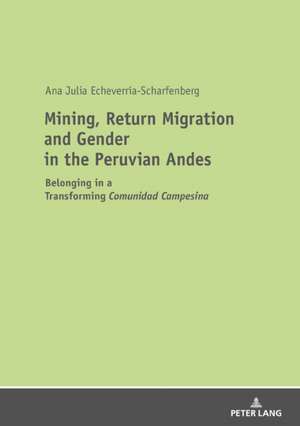Mining, Return Migration and Gender in the Peruvian Andes
Autor Ana Echeverria-Scharfenbergen Limba Engleză Hardback – 17 dec 2018
Preț: 455.19 lei
Preț vechi: 591.15 lei
-23% Nou
Puncte Express: 683
Preț estimativ în valută:
87.10€ • 91.17$ • 72.50£
87.10€ • 91.17$ • 72.50£
Carte tipărită la comandă
Livrare economică 31 martie-14 aprilie
Preluare comenzi: 021 569.72.76
Specificații
ISBN-13: 9783631764862
ISBN-10: 3631764863
Pagini: 282
Dimensiuni: 149 x 213 x 25 mm
Greutate: 0.52 kg
Ediția:Nouă
Editura: Peter Lang Copyright AG
ISBN-10: 3631764863
Pagini: 282
Dimensiuni: 149 x 213 x 25 mm
Greutate: 0.52 kg
Ediția:Nouă
Editura: Peter Lang Copyright AG
Notă biografică
Ana Julia Echeverría-Scharfenberg completed Magister studies in political science, anthropology and Spanish at the Rheinische Friedrich-Wilhelms-Universität Bonn, including a year at the PUCP in Lima. After working in the European Parliament, she pursued her Dr. phil. at the Ludwig-Maximilians-Universität München.
Cuprins
Methods and fieldwork conditions --- Transforming setting: mining project, return migration, time and space --- The comunidad: legal institution, territory, cooperation, political function --- Belonging and membership: tradition and innovation, gender inequality incl. migration, performing belonging
Descriere
This book analyses how a peasant community in Peru lives the transformations induced by a mining project. Among others, the community excluded some members. Drawing on ethnographic methods and the emic interpretation of happenings, the author examines how the community's concept of belonging is influenced by return migration and gender.
